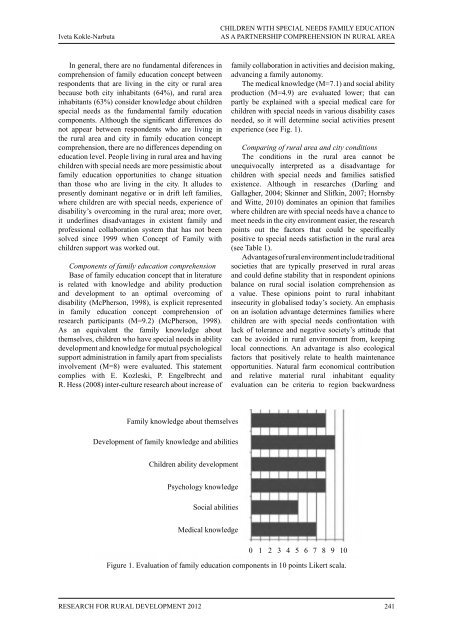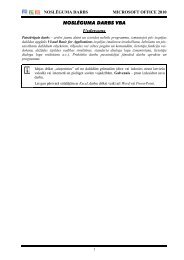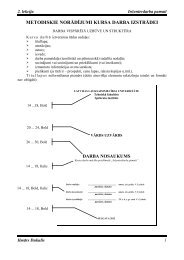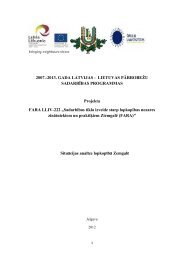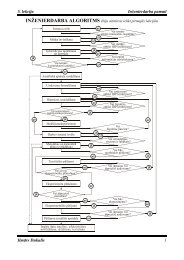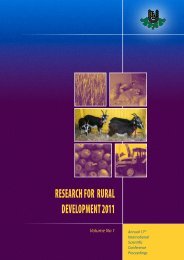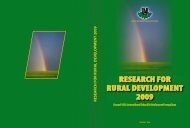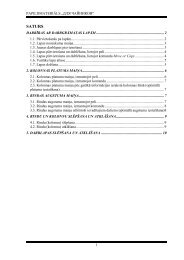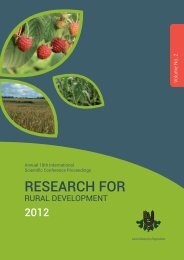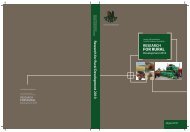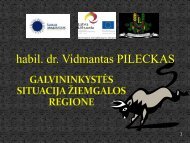LATVIA UNIVERSITY OF AGRICULTURE - Latvijas ...
LATVIA UNIVERSITY OF AGRICULTURE - Latvijas ...
LATVIA UNIVERSITY OF AGRICULTURE - Latvijas ...
- No tags were found...
Create successful ePaper yourself
Turn your PDF publications into a flip-book with our unique Google optimized e-Paper software.
Iveta Kokle-NarbutaCHILDREN WITH SPECIAL NEEDS FAMILY EDUCATIONAS A PARTNERSHIP COMPREHENSION IN RURAL AREAIn general, there are no fundamental diferences incomprehension of family education concept betweenrespondents that are living in the city or rural areabecause both city inhabitants (64%), and rural areainhabitants (63%) consider knowledge about childrenspecial needs as the fundamental family educationcomponents. Although the significant differences donot appear between respondents who are living inthe rural area and city in family education conceptcomprehension, there are no differences depending oneducation level. People living in rural area and havingchildren with special needs are more pessimistic aboutfamily education opportunities to change situationthan those who are living in the city. It alludes topresently dominant negative or in drift left families,where children are with special needs, experience ofdisability’s overcoming in the rural area; more over,it underlines disadvantages in existent family andprofessional collaboration system that has not beensolved since 1999 when Concept of Family withchildren support was worked out.Components of family education comprehensionBase of family education concept that in literatureis related with knowledge and ability productionand development to an optimal overcoming ofdisability (McPherson, 1998), is explicit representedin family education concept comprehension ofresearch participants (M=9.2) (McPherson, 1998).As an equivalent the family knowledge aboutthemselves, children who have special needs in abilitydevelopment and knowledge for mutual psychologicalsupport administration in family apart from specialistsinvolvement (M=8) were evaluated. This statementcomplies with E. Kozleski, P. Engelbrecht andR. Hess (2008) inter-culture research about increase offamily collaboration in activities and decision making,advancing a family autonomy.The medical knowledge (M=7.1) and social abilityproduction (M=4.9) are evaluated lower; that canpartly be explained with a special medical care forchildren with special needs in various disability casesneeded, so it will determine social activities presentexperience (see Fig. 1).Comparing of rural area and city conditionsThe conditions in the rural area cannot beunequivocally interpreted as a disadvantage forchildren with special needs and families satisfiedexistence. Although in researches (Darling andGallagher, 2004; Skinner and Slifkin, 2007; Hornsbyand Witte, 2010) dominates an opinion that familieswhere children are with special needs have a chance tomeet needs in the city environment easier, the researchpoints out the factors that could be specificallypositive to special needs satisfaction in the rural area(see Table 1).Advantages of rural environment include traditionalsocieties that are typically preserved in rural areasand could define stability that in respondent opinionsbalance on rural social isolation comprehension asa value. These opinions point to rural inhabitantinsecurity in globalised today’s society. An emphasison an isolation advantage determines families wherechildren are with special needs confrontation withlack of tolerance and negative society’s attitude thatcan be avoided in rural environment from, keepinglocal connections. An advantage is also ecologicalfactors that positively relate to health maintenanceopportunities. Natural farm economical contributionand relative material rural inhabitant equalityevaluation can be criteria to region backwardnessFamily knowledge about themselvesDevelopment of family knowledge and abilitiesChildren ability developmentPsychology knowledgeSocial abilitiesMedical knowledge0 1 2 3 4 5 6 7 8 9 10Figure 1. Evaluation of family education components in 10 points Likert scala.Research for Rural Development 2012241


